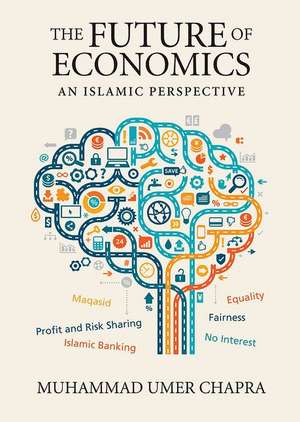The Future of Economics: An Islamic Perspective
Autor Umer Chapra, M. Umer Chapraen Limba Engleză Paperback – 14 noi 2016
This profound book is a powerful yet balanced critique of mainstream economics that makes a forceful plea for taking economics out of its secular and occident-centred cocoon. It presents an innovative and formidable case to re-link economics with moral and egalitarian concerns so as to harness the discipline in the service of humanity.
M. Umer Chapra is ranked amongst the Top 50 Global Leaders in Islamic economics (ISLAMICA 500, 2015) and has been awarded with two prestigious awards for his contributions to the field: Islamic Development Bank Award for Islamic Economics (1989) and the King Faisal International Prize for Islamic Studies (1989).
M. Umer Chapra is ranked amongst the Top 50 Global Leaders in Islamic economics (ISLAMICA 500, 2015) and has been awarded with two prestigious awards for his contributions to the field: Islamic Development Bank Award for Islamic Economics (1989) and the King Faisal International Prize for Islamic Studies (1989).
Preț: 134.05 lei
Preț vechi: 182.00 lei
-26% Nou
Puncte Express: 201
Preț estimativ în valută:
25.65€ • 26.84$ • 21.31£
25.65€ • 26.84$ • 21.31£
Carte indisponibilă temporar
Doresc să fiu notificat când acest titlu va fi disponibil:
Se trimite...
Preluare comenzi: 021 569.72.76
Specificații
ISBN-13: 9780860373452
ISBN-10: 0860373452
Pagini: 446
Dimensiuni: 146 x 210 mm
Greutate: 0.59 kg
Editura: Islamic Foundation
ISBN-10: 0860373452
Pagini: 446
Dimensiuni: 146 x 210 mm
Greutate: 0.59 kg
Editura: Islamic Foundation
Notă biografică
M. Umer Chapra is a research advisor at the Islamic Research and Training Institute of the Islamic Development Bank, Jeddah, and author of The Future of Economics and Islam and the Economic Challenge. He is ranked amongst the Top 50 Global Leaders in Islamic economics (ISLAMICA 500, 2015) and has been awarded with two prestigious awards for his contributions to the field: Islamic Development Bank Award for Islamic Economics (1989), King Faisal International Prize for Islamic Studies (1989).
Cuprins
Introduction: Is it Necessary to Have Economics with an Islamic Perspective?
Chapter 1: Conventional Economics
Chapter 2: The Islamic Paradigm Through History
Chapter 3: Can Science be Built on a Religious Paradigm? (The Conflict of Reason and Revelation in the Muslim World and its Modern Implications)
Chapter 4: Islamic Economics: What Should It Be?
Chapter 5: Socio-Economic Dynamics of Classical Islamic Economics
Chapter 6: The Causes of Muslim Decline: Applying Ibn Khaldun¿s Analysis to Muslim History
Part I: Are Islam and Moral Degeneration the Causes of Decline?
Part II: The Trigger Mechanism and its Effects
Part III: Some Ibar (Lessons) of Muslim History
Chapter 7: The Recent Revival: A Survey
Part I: Money, Banking and Monetary Policy
Part II: Macroeconomics and its Microfoundations
Part III: Public Finance
Chapter 8: The Future Course of Action
Bibliography
Index
Chapter 1: Conventional Economics
Chapter 2: The Islamic Paradigm Through History
Chapter 3: Can Science be Built on a Religious Paradigm? (The Conflict of Reason and Revelation in the Muslim World and its Modern Implications)
Chapter 4: Islamic Economics: What Should It Be?
Chapter 5: Socio-Economic Dynamics of Classical Islamic Economics
Chapter 6: The Causes of Muslim Decline: Applying Ibn Khaldun¿s Analysis to Muslim History
Part I: Are Islam and Moral Degeneration the Causes of Decline?
Part II: The Trigger Mechanism and its Effects
Part III: Some Ibar (Lessons) of Muslim History
Chapter 7: The Recent Revival: A Survey
Part I: Money, Banking and Monetary Policy
Part II: Macroeconomics and its Microfoundations
Part III: Public Finance
Chapter 8: The Future Course of Action
Bibliography
Index
Descriere
Economics needs moral enrichment to make it really useful for mankind in its search for a just world order.
